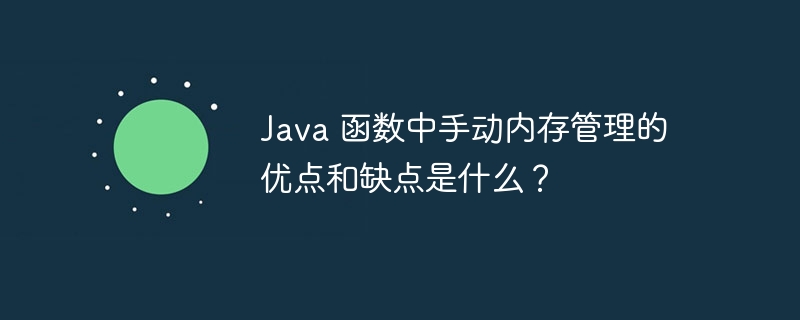Home >Java >javaTutorial >What are the advantages and disadvantages of manual memory management in Java functions?
What are the advantages and disadvantages of manual memory management in Java functions?
- WBOYWBOYWBOYWBOYWBOYWBOYWBOYWBOYWBOYWBOYWBOYWBOYWBOriginal
- 2024-05-02 09:21:021192browse
Advantages of manual memory management include reduced overhead, reduced memory fragmentation, and enhanced predictability; disadvantages include increased complexity, proneness to errors, and conflicts with GC. Weighing these advantages and disadvantages is critical in deciding whether to use manual memory management in specific situations where improving performance or reducing memory fragmentation is required.

Advantages and Disadvantages of Manual Memory Management in Java Functions
Java introduces automatic memory management, using a garbage collector to automatically release unused memory at runtime object. However, manual memory management still has some advantages and disadvantages in certain situations.
Advantages
- Reduced Overhead: Manual memory management allows developers to explicitly release objects when needed instead of relying on the garbage collector. This improves performance by reducing the frequency and duration of garbage collection pauses.
- Reduce memory fragmentation: The garbage collector may leave memory fragmented when it releases objects, while manual memory management allows developers to reduce fragmentation by freeing objects as soon as they are no longer needed. .
- Enhanced Predictability: Manual memory management enables developers to determine when objects are released, thereby enhancing application determinism and predictability.
Disadvantages
- Increased complexity: Manual memory management requires developers to write additional code to track the lifetime of objects and release them. This increases the complexity of the code and may lead to errors.
- Error-prone: If the object is not released correctly, it may cause a memory leak or other errors. This can be difficult to find and debug.
- Conflicts with GC: In an environment with automatic memory management, manual memory management may conflict with the garbage collector, which may lead to unpredictable behavior.
Practical Case
Consider the following code snippet:
public class MemoryManagement {
public static void main(String[] args) {
// 创建一个对象并将其分配给变量
Object obj = new Object();
// 使用该对象
// 手动释放对象
obj = null;
}
}By setting obj to null, the developer The object was released manually. This ensures that objects are released as soon as they are no longer needed, reducing potential memory leaks.
Conclusion
Manual memory management has both advantages and disadvantages in Java. It can be beneficial in situations where you need to improve performance, reduce memory fragmentation, or enhance predictability. However, it is important to weigh these advantages against the added complexity, possibility of errors, and potential conflicts with the garbage collector.
The above is the detailed content of What are the advantages and disadvantages of manual memory management in Java functions?. For more information, please follow other related articles on the PHP Chinese website!

